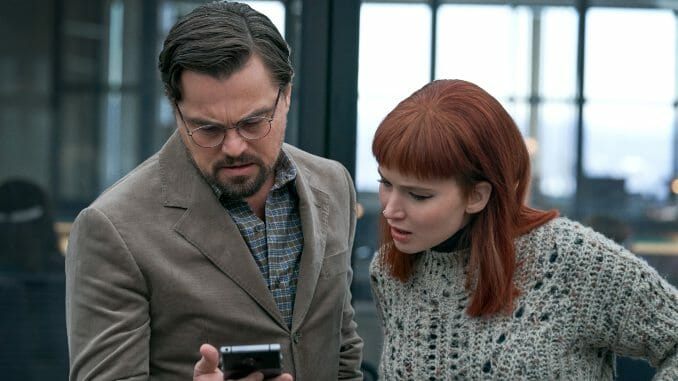Long, Dull Don’t Look Up Is a Better Doomsday Film than Political Satire

In 2021, there are more reasons than one might have been previously comfortable with for legitimately fretting about the end of the world. And while the downfall of humankind likely won’t be coming as expediently as an extinction-level threat heading on a crash course for Earth, director Adam McKay’s new doomsday comedy/“timely” political satire Don’t Look Up attempts to congeal populism and the pandemic and climate change and all that which causes us to recoil against the unknowable future into one immediate, planet-killing orb. If that seems like a better and quicker way for us to go out in retrospect, McKay doesn’t make the path towards potential desolation easy. He plays out scenarios that, now, come across less like Idiocracy and more like genuine, scientific hypothesizing about how our world would react to the knowledge that we have six months left to live. Businessmen and politicians would attempt to financially leverage the situation at the cost of human lives; brainless hashtags would proliferate on social media; half the population would believe it to be a hoax; and the people who broke the story would be branded as cranks…to some extent.
So, who better to articulate this existential dread at large than resident Hollywood goofball comedy director-turned-political theorist McKay, in his first wholly fictionalized film since Anchorman 2: The Legend Continues? The result is a star-studded Netflix affair with an unfunny running gag in which PhD candidate Kate Dibiasky (Jennifer Lawrence) cannot let go of how a general at the White House made her pay for snacks from the breakroom that were actually free of charge. Kate, her superior—low-level astronomer Randall Mindy (Leonardo DiCaprio)—and scientist Dr. Teddy Oglethorpe (Rob Morgan) are summoned to the Oval Office following Kate’s celestial discovery that brings an existential threat to humankind. President Orlean (Meryl Streep), however, is scandal-making, shameless, ignorant and apathetic, with (surprise) a son (Jonah Hill) who overtly wants to fuck her as her Chief of Staff. Lady Trum—I mean, Orlean, is only concerned with that which can bolster her image in the upcoming midterms, so she dismisses Kate and Mindy’s dire predictions. This forces the pair, with the help of Oglethorpe, to leak the information on a fluffy talk news spot (with pundits Tyler Perry and a very smooth, toothy Cate Blanchett), the biggest response to which is that Kate is branded hysterical and Mindy as an AILTF (Astronomer I’d Like To Fuck), becoming the winsome face of human extinction.
Further drawing similarities to a former president whose name I just can’t quite recall, Orlean, too, has an unqualified Supreme Court Justice nominee in the works: A former pornographic actor that she’s having an affair with. When the scandal around that situation turns ugly for her, Orlean finally decides to enlist the help of the deadly comet to boost her in the polls. But when the whisper-talking, eye-contact-avoiding billionaire CEO of BASH cellular (Mark Rylance) uses his in-house scientific team to discover rare minerals within the comet, the plan to nuke it is scrapped in favor of allowing the comet to remain partially intact for mining. Suddenly, the comet is not a planet-killer, but a job-creator in “these uncertain times,” as Mindy quite literally says out loud during a pro-comet ad spot. Unrelated, did you know that this movie was made during the COVID-19 pandemic?
It’s easy to brand McKay as a too-online, lib-brained Gen Xer, making a film which implores us to guffaw at its Lady Trump and stand up and applaud at lines denoting politicians as “not smart enough to be as evil as you’re giving them credit for.” But, well, it is easy. It seems that McKay has lost the cinematic plot; his last true-blue comedy film, Anchorman 2, came out nearly a decade past, and The Big Short, his arguably riveting debut into the world of political skewering, over half a decade. 2018’s Vice serves, then, as an interesting bridge between The Big Short and Don’t Look Up, which goes all-in on the more annoying aspects of the former and pulls back on these tendencies for the latter (there is only one smug metatextual explainer in Don’t Look Up, for example). Still, it’s as if McKay doesn’t really remember how to make a comedy anymore, trying to create bits out of rambling asides and deviations that aren’t actually funny. Instead, he’s too laser-focused on offering the most vanilla, late-night talk show form of political satire that will make your liberal parents nod and smile and feel good about themselves for being on the right side of things.
-

-

-

-

-

-

-

-

-

-

-

-

-

-

-

-

-

-

-

-

-

-

-

-

-

-

-

-

-

-

-

-

-

-

-

-

-

-

-

-








































